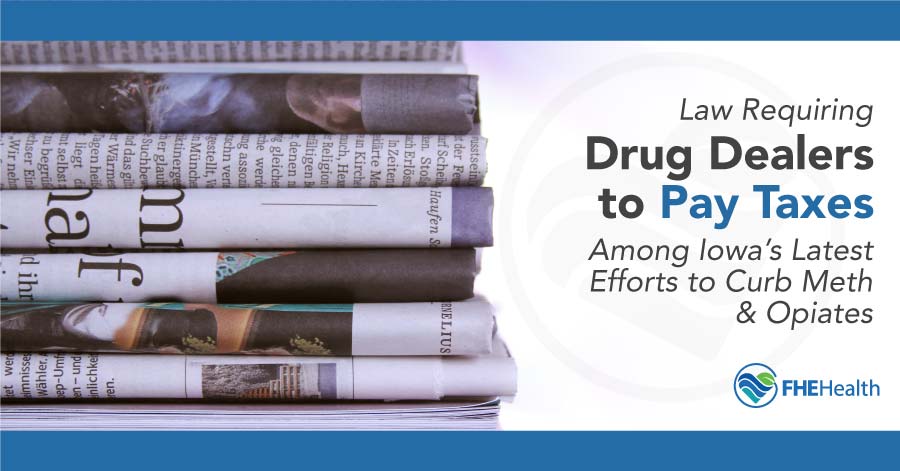
Every state combats drub abuse, addiction, and drug-related crimes a little differently. And while many states are failing to achieve the types of positive results in the battle to generate headlines, Iowa is experiencing a reduction in opioid-related overdose deaths. Yet, as Iowa focuses on abuse of opioids like heroin and prescription painkillers, meth has become a growing threat. Among Iowa’s various solutions for curtailing the drug problem: an unusual measure to tax drug dealers.
Unusual Tax Laws
A June 12 article in the Des Moines Register reported that Iowa is one of a few states that have laws on their books that make it a crime to sell illegal drugs without first obtaining a state-issued stamp as evidence that you’ve paid the tax. Those who don’t buy the stamps, the article reported, face a penalty and fines for tax evasion. After being caught by authorities, drug dealers—and one must assume that few (if any) are obtaining the state-issued stamps—dealers are faced with a bill for the taxes they owe on the illegal substances they were selling and the penalties for failing to pre-pay for the stamps. These penalties can be substantial.
In Iowa, one woman who was apprehended by Iowa police outside of Des Moines was found with meth amounting to a street value of $5,200. However, her bill to the state of Iowa is $157,936, an amount that the single mother of two is unlikely to be able to repay. These laws, largely enacted during the 1980s and 90s, are awash in weirdness, but there are actually almost 20 states that require payment from criminals for their illicit business.
Critics of the law suggest that it’s unethical for the state to, on the one hand, ban activities like drug dealing but then to, on the other hand, profit from the sale of those drugs. Other critics say that it’s simply over-penalizing non-violent offenders, and effectively putting them in “double jeopardy” and violating their 5th amendment rights. However, the state has said that it doesn’t often resort to charging individuals with these tax evasions but that the laws are useful when negotiating plea deals.
Here’s the question: are these laws making a difference in the fight against drugs? For someone like a single mother, trying to get clean and stop dealing, it would be virtually impossible for her to repay her debt, especially as interest compounds for each year the debt is unpaid. After serving jail time for their crimes, these individuals face more challenges to reintegrate into their communities with massive amounts of debt hanging over their lives.
Opioid-Related Deaths Are Down
Iowa’s weird illegal drug excise taxes may not be doing much to solve the drug crisis, but it seems that the overdose-reversal drug Narcan is. Since 2018, Iowa has experienced a 33 percent drop in opioid overdose deaths. Healthcare providers attribute the decrease to improved access to the drug Narcan. The state’s public health department has taken substantial measures to increase the drug’s availability. As a result, Iowa now has one of the lowest rates of opioid-related overdose deaths.
While healthcare providers view this as great news, they still point out the need for improving access to addiction treatment. Saving one life is significant, but they also know that the risk for each individual saved is still great without follow-up addiction therapy.
Meth: A Continuing Problem for Iowa
In spite of the excise tax that meth dealers could face if caught, meth-dealing is still a serious problem for the state. In fact, according to the Director of the Governor’s Office of Drug Control Policy, “Methamphetamine actually remains a much bigger issue if you’re measuring on volume of cases, the number of people who are involved, number of crimes being committed etc…”
The Des Moines Register recently reported that “Nobody wants Mexican pot anymore. So the cartels are producing higher-quality meth and in bigger quantities.” The article also stated that Iowans screened at addiction rehabs were mainly seeking help for a meth addiction more than any other drug— including alcohol.
Addiction Treatment Is Essential
Whether the drugs in question are opioids or meth, the need for addiction treatment remains critical. These drugs, taxed or untaxed, legal or illegal, are highly addictive. People addicted to them cannot manage their addictions without professional support. Even with treatment, relapse rates are sobering. Many individuals require on-going treatment and aftercare in order to prevent future relapse. While long-term recovery is possible, it invariable takes the right treatment center a support structure over months to get there.
FHE Health offers multiple treatments and therapies for people suffering from substance addiction. It features both inpatient and outpatient programs that are flexible while still remaining effective for helping people achieve their recovery goals. Without treatment, the risk for overdose and other drug-related health problems remains high. If you or a loved one is living with a substance abuse or addiction problem, consider how FHE Health can help you manage this problem for good.






